Support with your everyday life
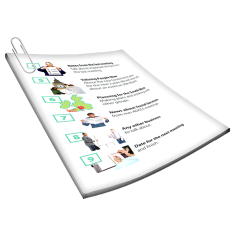
This information is about the supports you can get for your everyday life.
It has information on
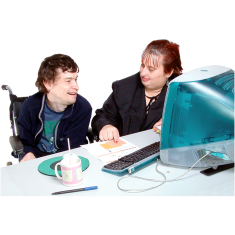
- Disability and government services

- Supports for daily life skills
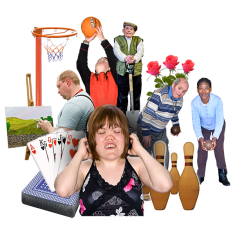
- Day centres and programs
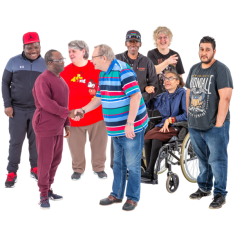
- Community activities and groups

- Job support
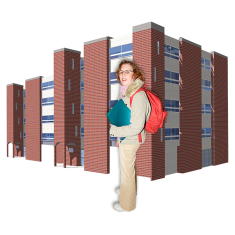
- Educational supports
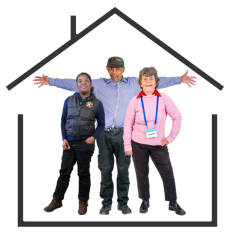
- Housing supports

There is a lot of information.
Some words can be hard to understand.
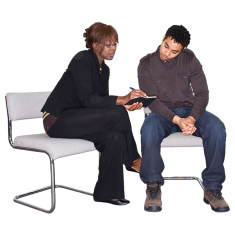
You can ask someone to read this information with you.
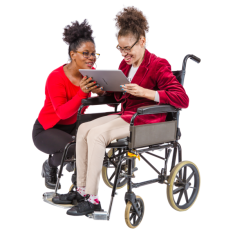
You can find support for many parts of your life from disability services with funding from the NDIS.
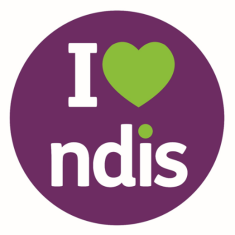
NDIS funded services are called NDIS providers.
NDIS is short for National Disability Insurance Scheme.

You can find support for many parts of your life from the government.

The NDIS helps to support you to be more independent and take part in community and working life.
Independent means that you can make your own choices and do some things on your own.

To find out about the NDIS
- See the Easy Read booklets https://www.ndis.gov.au/about-us/publications/booklets-and-factsheets
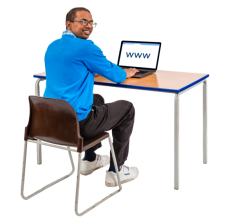
To find a NDIS provider go to https://ndis-providerfinder.com/

There are many disability support providers in the community.
They support people with intellectual disability in all parts of life.
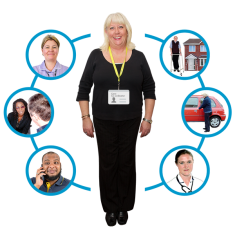
To find disability support providers near you communicate with your NDIS Support Coordinator.
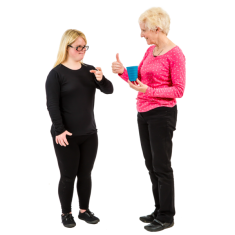
To communicate is how you understand and share your feelings or information.

A support coordinator is a person who helps plan and organise
- Your care
- Other services you get

You can also do an internet search for the type of service you want near you.
For example you can go to https://www.disabilitygateway.gov.au/

The government provides support in many areas including
- Getting a job

- Study

- Finding a home

People with disability can be supported to live as independently as possible.
You can have plans and support to help you to develop daily life skills.

Daily life skills are tasks you need to do to care for yourself.
Daily life skills could include
- Cooking
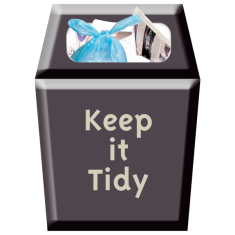
- Cleaning
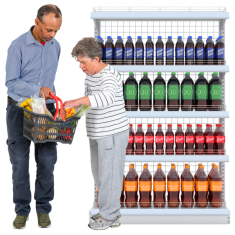
- Shopping

- Self-care
Self-care means doing things to look after yourself and feel well.

- Paying bills
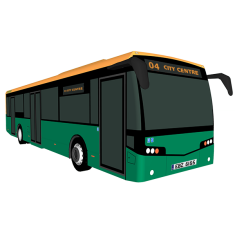
- Taking public transport

You can communicate with your NDIS Support Coordinator about skills you would like to learn.

A day centre is a place where you may go during the day to see friends and take part in activities.
Many local disability services have day centres.

You can communicate with your NDIS Support Coordinator about centres and programs that might be right for you.

There are many groups and activities for people with disability.
The groups can support you to
- Get involved in your community
- Make friends
- Learn new skills
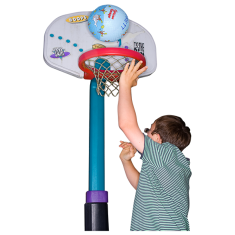
Some examples of community activities include
- Sports groups
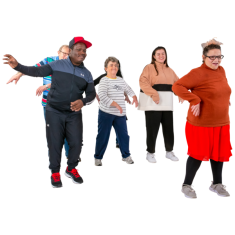
- Dancing
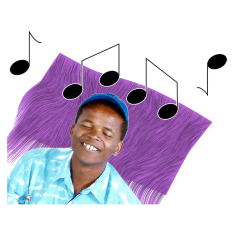
- Singing
- Going to the theatre and concerts

- Movie groups

To find groups that interest you
- Search online

- Ask your NDIS Support Coordinator

Job support is also known as vocational support.

Job support services provide skills and education to support you to get ready for work.
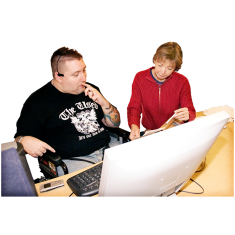
Many disability support providers can support you to get a job.

Below are some websites and information about job support.

The NDIS has Easy Read information on planning for work.
To see the Easy Read information go to https://easyread.ndis.gov.au/planning-for-work/

Everyone Can Work is a website for
- People with intellectual disability
- Their families
- Their support networks
For more information about Everyone Can Work go to https://www.everyonecanwork.org.au/

The Australian Network on Disability has information to prepare you to look for a job.
To see the information go to https://www.and.org.au/students-jobseekers/jobseeker-toolkit/

Ethnic Community Services Co-operative has disability services for people who come from different cultures.
The services can offer job support.
For more information about the services go to https://ecsc.org.au/disability-services/
Government job services

Job Access can help you find support and information.
For more information about Job Access go to https://www.jobaccess.gov.au/
For more information about supports that are available go to https://www.jobaccess.gov.au/people-with-disability/available-support

Disability Employment Services can support you to find and keep a job.
Employment is another word for job or work.

For more information about Disability Employment Services go to https://www.jobaccess.gov.au/people-with-disability/about-des
To find a provider go to https://www.jobaccess.gov.au/find-a-provider

IncludeAbility has information if you are looking for work.
To see the information go to https://includeability.gov.au/resources-people-disability

RecruitAbility encourages people to apply for Australian Public Service jobs.
Public service jobs are when you work for the government.
For more information about public service jobs go to https://www.apsc.gov.au/working-aps/diversity-and-inclusion/disability/recruitability

Educational supports help people with disability to study.
Educational supports could be at
- School

- Online

- University
- TAFE
- Private colleges
These places are for higher education.

TAFE is somewhere you can study and learn skills.
Higher education is when you study after you finish school.

The place where you study will have more information on supports they can offer.
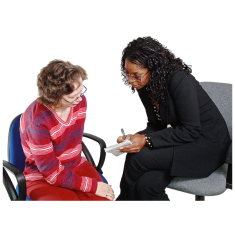
NDIS participants can get support to study after school with an NDIS educational plan.
Many disability support providers offer support with study.

For more information about educational supports communicate with your NDIS Support Coordinator.

Below are websites and information for higher education and study.
For information from the NSW Government about disability learning and support go to https://education.nsw.gov.au/teaching-and-learning/disability-learning-and-support

Australian Disability Clearinghouse on Education and Training has information on how you can prepare to study after school.
To see the information go to https://www.adcet.edu.au/students-with-disability

The National Disability Coordination Officer Program can support you to take part in higher education.
For information that can support you go to https://www.adcet.edu.au/ndco

The Uni 2 Beyond program can support you to take part in university life.
For more information about the Uni 2 Beyond program go to https://cds.org.au/uni-2-beyond/
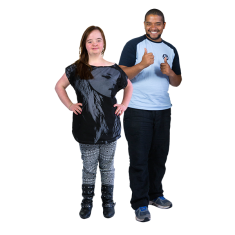
Uni 2 Beyond means you can go to classes with support from a mentor.
A mentor is person who guides and assists you.
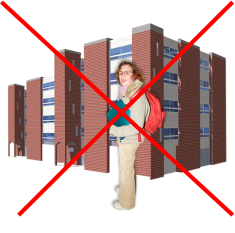
Students who are part of Uni 2 Beyond are not enrolled so you do not have to pay fees to the university.
Not enrolled means that you do not get a degree.

A degree is something you get after you do higher education study.

You may be able to get money from the government to support your education if you get a Disability Support Pension.
For more information about the Disability Support Pension go to https://www.servicesaustralia.gov.au/pensioner-education-supplement

Housing supports can help you to
- Find a home that is right for you

- Be more independent such as be able to live on your own

- Get support in your home such as help with cooking
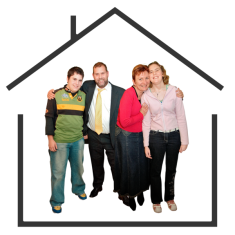
There are 2 types of housing support
- Individual housing
Individual housing means you live in a home on your own or with family.

You can have daily support such as meals brought to you and support with public transport.

- Shared housing or group homes
Shared housing is where you live in a house provided by a disability provider with other people.

Shared housing is for people who need more support with daily life skills.

Housing support can be provided by
- NDIS funded disability support providers

- The government
NDIS housing supports

NDIS housing supports include
- Individual Living Options
Individual Living Options provides supports that are right for you in your own home.

For more information about Individual Living Options go to https://www.ndis.gov.au/participants/home-and-living/individualised-living-options

- Supported Independent Living
Supported Independent Living provides supports for daily life skills and transport for you if you live in your own home.

For more information visit https://www.ndis.gov.au/participants/home-and-living/supported-independent-living-participants

- Specialist Disability Accommodation
Specialist Disability Accommodation is for people with very high support needs.
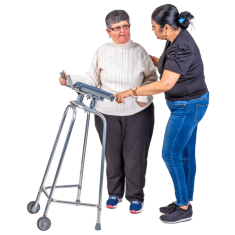
Very high support needs means that you need someone to support you every day.

The NDIS funding provides the home you will live in.
You will usually still need to pay rent.
Rent is money you have to pay regularly to live in a home you do not own.

For more information go to https://www.ndis.gov.au/participants/home-and-living/specialist-disability-accommodation-explained
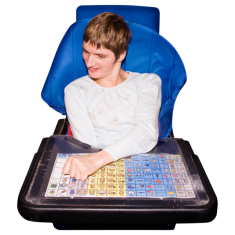
NDIS supports can also provide assistive technology.
For more information about assistive technology go to https://www.ndis.gov.au/participants/assistive-technology-explained
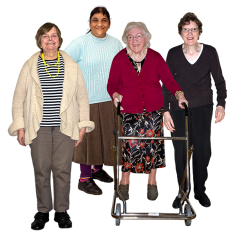
The NDIS can also support you to move to aged care housing when you grow older.
For more information go to https://www.ndis.gov.au/participants/home-and-living/living-and-moving-out-residential-aged-care
Government housing

Housing services provided by the government are known as social housing.
Public housing and community housing are types of social housing.

Public housing is provided by the Department of Communities and Justice.
This is a government department.
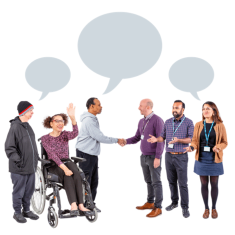
Community housing is provided by community groups.
They get support from the government.

For more information about social housing go to https://www.facs.nsw.gov.au/myhousing
Supported housing that is right for you

If you need supported housing or want to change your housing supports you can communicate with your
- NDIS Support Coordinator
- GP
- Other health worker

You can also
- Go to https://askizzy.org.au/

- Call Link2home on 1800 152 152 for information or a referral to a housing service
A referral is when someone suggests you see a worker who can support you.

- Communicate with your manager or support staff if you live in shared housing
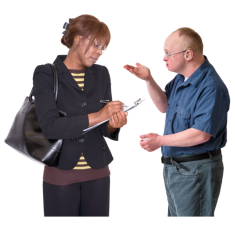
- Make a complaint if you are not happy with your home
A complaint is when you let someone know you are not happy with something.
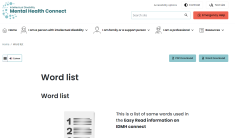
There are some tricky words on this Easy Read page.
For more information about these words go to